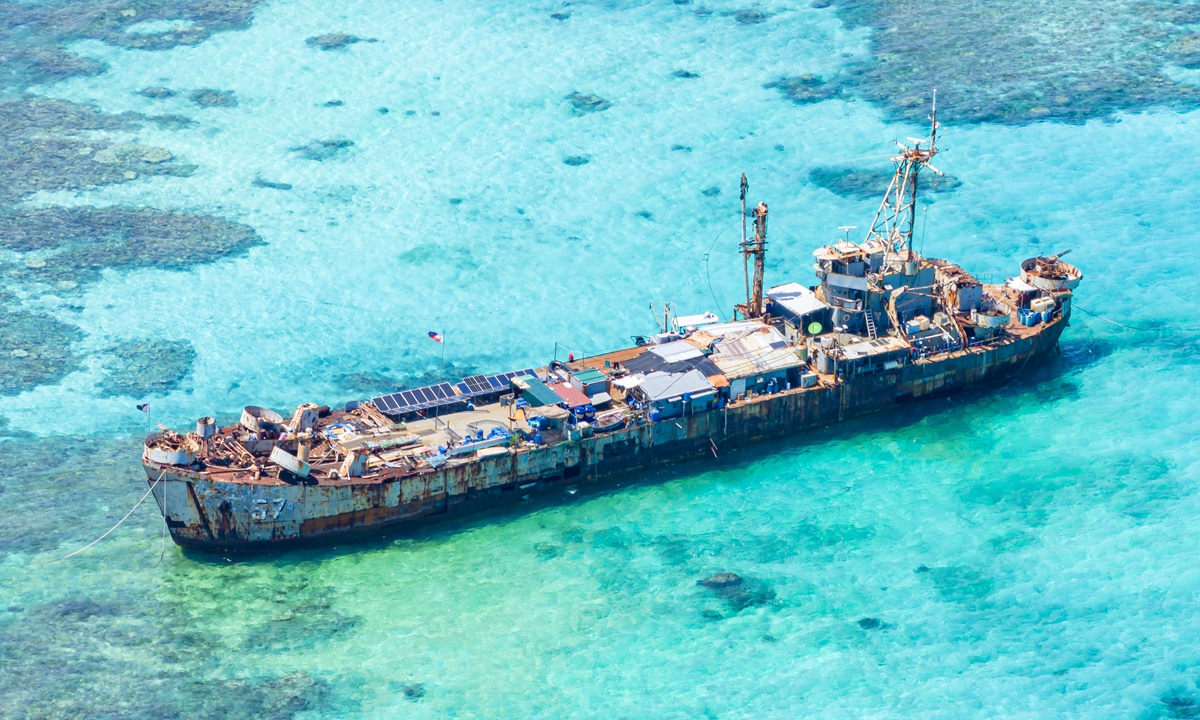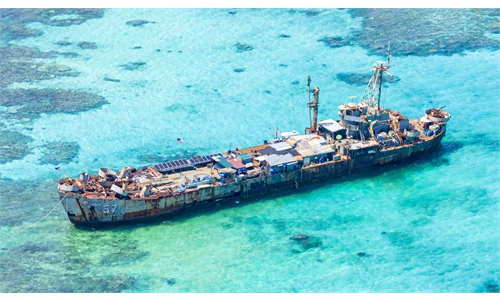IN-DEPTH / IN-DEPTH
Philippines' response to evidence of ecological destruction in S.China Sea 'weak and untenable,' reflects nervousness, experts say

The Philippine illegally grounded warship BRP Sierra Madre at Ren'ai Jiao Photo: Courtesy of South China Sea Ecological Center of China's Ministry of Natural Resources
Following the evidences released by China that reveal the Philippine illegally grounded warship as the main cause of damage to the coral system of Ren'ai Jiao, the Philippines has chosen to ignore the facts and said that the "Chinese experts" are spreading falsehoods in a statement on Tuesday. Experts called the response "weak and untenable" as it shifted blame, deflected attention and made baseless accusations against China, showing their desperation after being caught in their destructive actions by scientific evidence.
"China has the right to conduct environmental investigations and take corresponding measures, whether it is about safeguarding territorial sovereignty or protecting the marine environment of their own country," said Ding Duo, a deputy director of the Institute of Maritime Law and Policy at the China Institute for South China Sea Studies.
Faced with China's authoritative and credible report, the Philippines is unable to defend themselves and can only resort to mudslinging, Ding said. The Philippines cannot even provide a single example in their statement of how they have safely disposed of the daily accumulation of waste and garbage from their personnel stationed on the grounded vessel on Ren'ai Jiao (also known as Ren'ai Reef) year after year.
In its statement by the Philippine National Task Force, the Philippines, however, turns the tables, laying the blame on China for building a large artificial island on Meiji Jiao (also known as Meiji Reef) that inflicts harm on the coral habitat.
"The construction of islands and reefs in the South China Sea falls within China's sovereignty and is deemed lawful, reasonable and justified. The Chinese government has emphasized that this development is not directed at any specific country, will not impede the freedom of navigation and overflight guaranteed to all nations in the South China Sea under the international law, and will not harm the marine ecological environment of the region," said Yang Xiao, a deputy director of the Institute of Maritime Strategy Studies at the China Institute of Contemporary International Relations, in an interview with the Global Times.
Furthermore, Yang highlighted that strict environmental standards and monitoring requirements are being implemented throughout the construction process, ensuring minimal impact on the marine ecosystem.
As a contracting party to a series of international treaties related to marine environmental protection, such as the Convention on Biological Diversity, the Convention on International Trade in Endangered Species of Wild Fauna and Flora, the UN Framework Convention on Climate Change, the London Convention, and the Ramsar Convention, China has consistently adhered to the stipulations of these raccords and fulfilled its international responsibilities.
The Philippines' statement sidestepped the facts presented by China and shifted the focus to other islands in the South China Sea, Yang said. "By that logic, could China also bring up the well-known pollution issues plaguing the Philippine Islands?" Yang questioned.
Yang criticized the Philippine military's statement for lacking professionalism and appearing to be a form of cognitive warfare. He questioned how the military's actions reflected on the Philippine government, suggesting that if military authorities were issuing statements on environmental issues, it could be seen as the government being run or represented by the military.
The Philippines smeared Chinese fishermen in the statement for their harvesting of endangered sea turtles, coral and giant clams in the South China Sea.
However, China's Sansha city, which oversees the Xisha, Zhongsha, and Nansha island groups and surrounding waters, has made significant efforts to protect sea turtles in recent years. A 24-hour monitoring and protection system has been implemented on sea turtles laying eggs on the shores. Official data show that due to these conservation efforts, a total of 1,734 nests with green sea turtle eggs had been discovered in the Xisha Islands from 2017 to 2023.
During an investigation in the Philippines in late March, reporters from the Global Times found that there are illegal sales of rare species such as giant clams in the black market. Additionally, endangered humphead wrasse from the South China Sea are readily available for purchase at a fish market in Manila.
The Philippines' request for a third-party marine scientific assessment in the South China Sea, as stated in their recent statement, is misleading the public. According to Ding, under the guidance of the Declaration on the Conduct of Parties in the South China Sea, China and ASEAN countries have established numerous cooperative mechanisms and made significant progress in environmental protection and conservation of biological resources in the region.
"Despite the provocative actions of the Ferdinand Marcos government in the Philippines last year, China has demonstrated patience, goodwill and proposed cooperation on fisheries, marine environmental protection and marine plastic waste management. This can be seen as a sincere and benevolent gesture towards fostering positive relations between the two countries," he noted.


